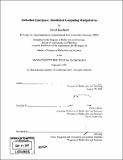Embodied emergence : distributed computing manipulatives
Author(s)
Bouchard, David, S.M. Massachusetts Institute of Technology
DownloadFull printable version (6.870Mb)
Alternative title
Distributed computing manipulatives
Other Contributors
Massachusetts Institute of Technology. Dept. of Architecture. Program in Media Arts and Sciences.
Advisor
Patricia Maes.
Terms of use
Metadata
Show full item recordAbstract
Distributed systems and the emergent properties that can arise out of simple localized interactions have fascinated scientists and artists alike for the last century. They challenge the notions of control and creativity, producing outcomes that can be beautiful, engaging and surprising at the same time. While extensive work has been done using computer simulations of such systems in fields like artificial life and generative art, their physically embodied counterparts are still in their infancy, in part due to the complexity of building and deploying such systems. In this thesis, I will discuss how simple tangible nodes can enable playful and creative experimentation with the concept of emergent behavior. Specifically, I will address how embodied interaction scenarios involving parallel systems can be implemented and how a range of sensing and actuating possibilities can be leveraged to generate novel and engaging experiences for the end users. In particular, the use of sound will be explored as a medium for representation. Finally, I will argue that there is value in making the transition from software simulations to a situated and manipulable instantiation of these concepts, both for the designer of a system and its users.
Description
Thesis (S.M.)--Massachusetts Institute of Technology, School of Architecture and Planning, Program in Media Arts and Sciences, 2007. Includes bibliographical references (p. 65-67).
Date issued
2007Department
Program in Media Arts and Sciences (Massachusetts Institute of Technology)Publisher
Massachusetts Institute of Technology
Keywords
Architecture. Program in Media Arts and Sciences.